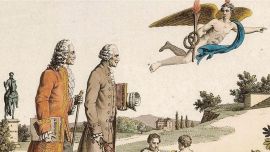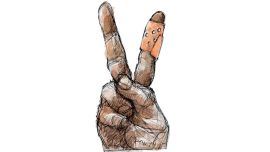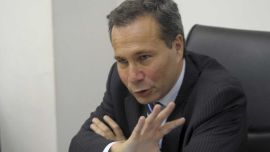Kirchnerites love power but dislike having to defend what they do with it. When Alberto Fernández occupied the Presidency, few made much of an effort to give their backing to his government’s policies. Instead, they treated the man as a shameless mediocrity who had somehow wormed his way into the country’s top job.
The most explicit in this respect was the lady who in effect let him have it because she thought he would appeal to “moderates” who were wary of her; without wasting a moment, Cristina Fernández de Kirchner moved into opposition in the hope that nobody would blame her for what was happening to the country under the government she had formed.
A couple of years ago, when it was already evident that Argentina was rushing headlong towards a hyperinflationary firestorm, the Kirchnerite government decided it would not be in its interest to put the brakes on. So instead of reducing public expenditure and slowing down the printing-presses that were churning out astronomical quantities of bright orange 1,000-peso banknotes, it did the reverse.
This faced them with a tricky dilemma; had their candidate, Sergio Massa, won the presidential race, they would have been left holding the huge bomb they had timed to go off when one of his “right-wing” rivals was in the Pink House. Luckily for them, Massa did not get quite enough votes in the first round to win outright and, in the decider, he was soundly thrashed by Javier Milei.
Nonetheless, things are now going as the more conspiratorially-minded Kirchnerite strategists had planned. By treating the economy for years like their own private cash cow, they ensured that the government that replaced theirs would have no option but to take many extremely painful measures of the kind that had led to the premature demise of the one headed by Fernando de la Rúa and gravely weakened that of Mauricio Macri.
Though it would seem that Milei still enjoys the approval of most of the population, this could quickly change, what with inflation devouring the already limited purchasing-power of millions of families and politicians of many stripes, including some who think the country really does need a strong dose of liberalism, accusing him of behaving like a dictator by demanding they rubber-stamp hundreds of laws that are designed to free the economy from the huge number of bureaucratic restrictions that are holding it back and, while about it, to deprive unscrupulous politicians and their friends of opportunities to acquire large sums of money. The Kirchnerites cannot object on principle to his attempt to sideline parliament because that is how they operated, but in their view consistency is an overrated virtue.
The fate of the still new government will depend largely on Milei’s ability to persuade people that the fearful emergency he goes on about is not just a figment of an overheated imagination but something terribly real which, unless it is dealt with very soon, would be certain to make their lives even more miserable than many already are. However, as the behaviour of many legislators, especially Peronist ones, is making clear, there are plenty of politicians who want to believe that the economy Milei “inherited” from the Kirchnerites is far from being as disease-ridden as he and others say it is, and that therefore there is no need for them to approve almost overnight the drastic measures he insists he is determined to take so it will have a chance of recovering from “a century of collectivist populism.” It would seem that, as far as such optimists are concerned, Argentina does not run the risk of being overwhelmed by hyperinflation and, under another government, could carry on much as before.
Unfortunately, refusing to change is no longer a feasible option. The government of a country which is bankrupt and shunned by creditors is obliged to choose between slashing public spending and allowing the financial markets to do “the dirty work” in their own remorseless fashion. As their behaviour in office made clear, the Kirchnerites would much prefer to step aside; experience has taught them that, if they protest vigorously against the inevitable consequences of such a move, they would manage to retain the electoral support of the victims of their fecklessness. After all, this is what their friends in Venezuela and Cuba have been doing for decades.
Milei, who – as could have been predicted – is being accused by fervent Kirchnerites of kowtowing to the market forces they would have left in charge of the economy, thinks the government should assume full responsibility for the ferocious cost-cutting that the circumstances demand. Whether he is aware of it or not, the archenemy of the “political caste” is in fact standing up for “politics” against the many individuals who would much rather let events take their course without any of their number making a serious attempt to influence what happens. With at least one Argentine in two below the poverty line, giving the markets free rein would surely be suicidal, but it would appear that few populist politicians find that particular prospect at all disturbing.
Milei warns that, if he fails in his attempt to turn Argentina into a fast-growing libertarian showcase, the country would not find itself under a kinder and more “progressive” government capable of making life easier for most of its inhabitants, but in a state of anarchy which would spell ruin for almost everyone. Scare tactics? Though in the past many governments, among them that of Carlos Menem, did make a habit of saying they were all that stood between the population and utter chaos, the problems they faced were less alarming than those confronting Milei’s which, in addition to having to deal with high inflation – last month, the consumer price index rose by 25.5 percent, something that would take 10 years in Europe or Japan – the Central Bank has little in its coffers apart from IOUs, vengeful “vulture funds” owed many billions of dollars are circling overhead and Argentina’s international reputation could hardly be worse.






















Comments